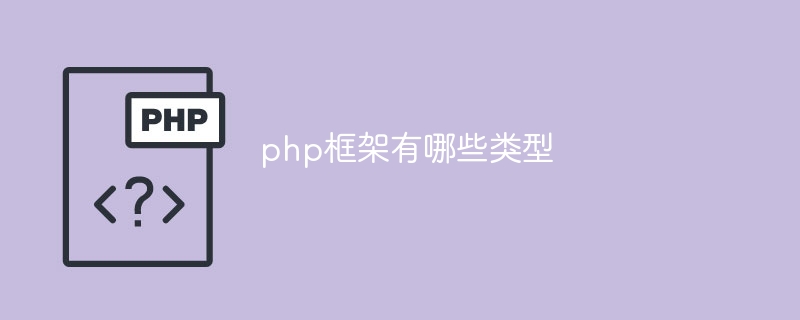
PHP framework types are based on MVC pattern, microservices and component framework. They are: 1. PHP frameworks based on the MVC model include Laravel, Symfony, CodeIgniter, and Yii; 2. Microservice frameworks include Slim and Lumen; 3. Component-based frameworks include CakePHP, Zend Framework, etc.

The operating environment of this tutorial: Windows 10 system, PHP8.1.3 version, Dell G3 computer.
PHP is a popular server-side scripting language widely used for web development. In order to improve development efficiency and code quality, PHP developers often use frameworks to speed up the development process and provide some useful functions and tools. This article will introduce some common PHP frameworks and classify them.
1. PHP framework based on MVC pattern
1. Laravel: Laravel is currently one of the most popular PHP frameworks. It provides a powerful routing system, template engine, database operation tools and other functions, uses elegant syntax and easy-to-understand code structure, and is very suitable for building large and complex web applications.
2. Symfony: Symfony is a high-performance, flexible and scalable PHP framework. It adopts a modular design, allowing developers to choose the required components to build applications. Symfony also provides many tools and documentation to simplify the development process and improve code quality.
3. CodeIgniter: CodeIgniter is a simple and lightweight PHP framework with high performance and flexibility. It does not require complicated configuration and learning curve, making it suitable for developers who want to quickly start their projects.
4. Yii: Yii is a high-performance PHP framework that adopts object-oriented design ideas and MVC pattern. It has rich functions, including database operations, caching, form validation, etc., which can help developers build complex web applications more easily.
2. Microservice framework
1. Slim: Slim is a lightweight PHP microservice framework with a simple API and flexible routing system. It is suitable for building simple RESTful APIs and lightweight web applications.
2. Lumen: Lumen is the microservices version of the Laravel framework, focusing on building high-performance microservices and API applications. It has similar syntax and functionality to Laravel, but is more lightweight and better suited for handling large numbers of requests.
3. Component-based framework
1. CakePHP: CakePHP is a feature-rich PHP framework that adopts the MVC model and the principle of convention over configuration. It provides many independent components that can be combined to build applications. CakePHP also provides powerful data validation and security features.
2. Zend Framework: Zend Framework is a mature PHP framework with strong security and flexibility. It adopts a modular design and can use various components as needed, such as database operations, form validation, email sending, etc.
The above are some common PHP frameworks, which are classified according to different needs and development goals. Developers can choose a framework that suits them based on the characteristics of the project and enjoy a more efficient and reliable development experience.
The above is the detailed content of What types of php frameworks are there?. For more information, please follow other related articles on the PHP Chinese website!